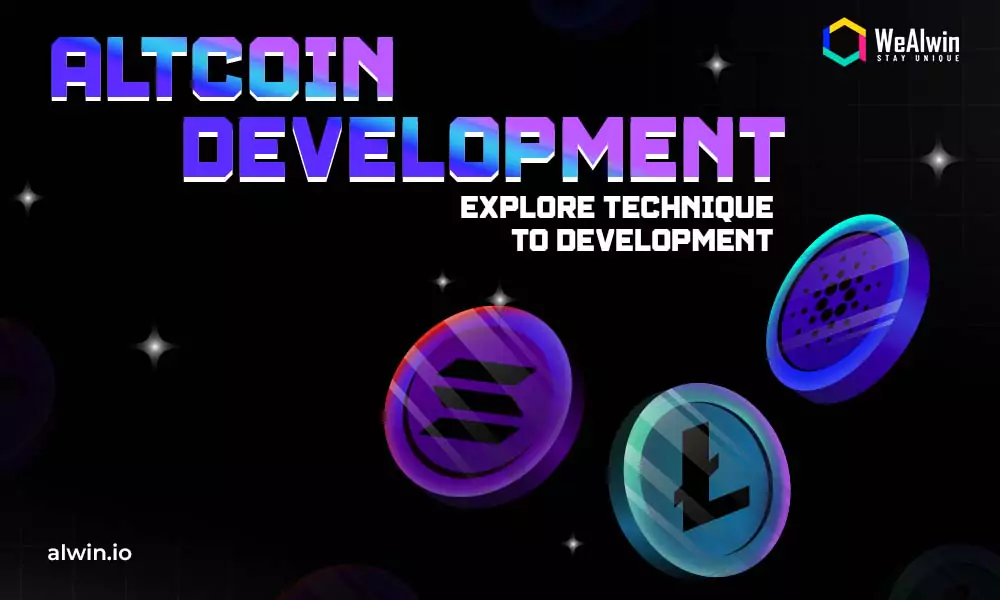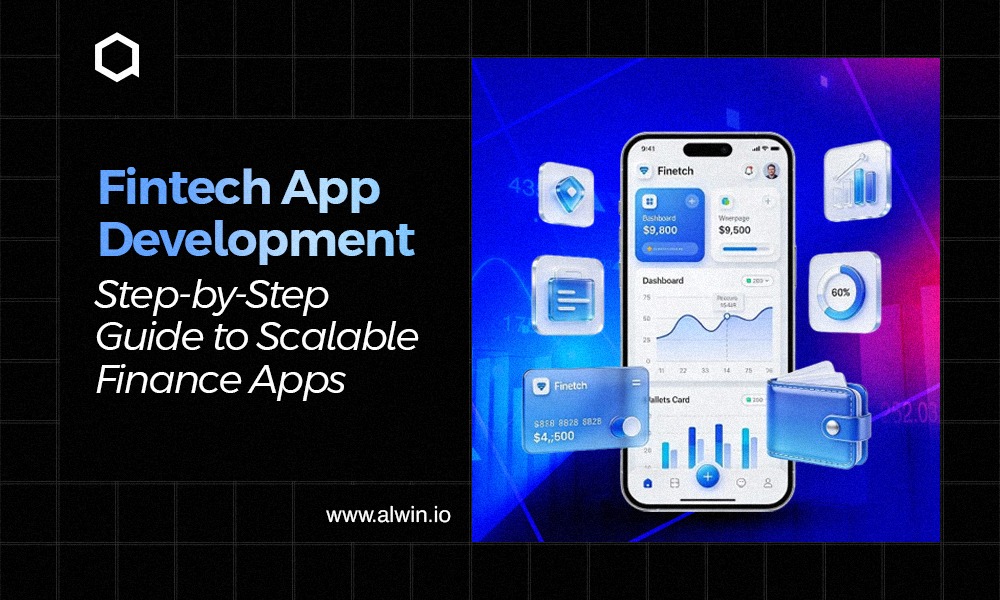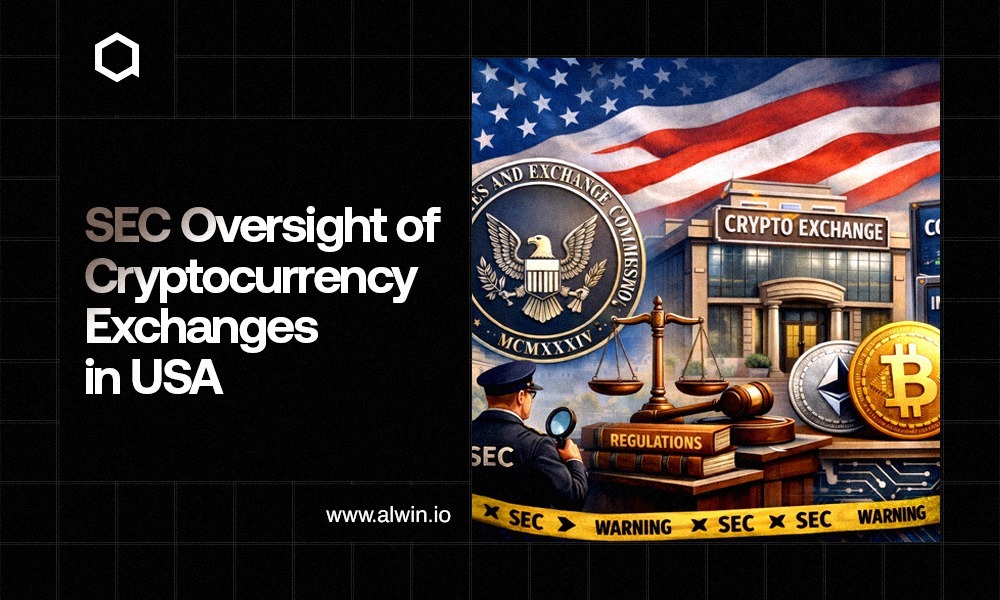In the world of digital finance, people are increasingly turning towards cryptocurrencies. Many are drawn to the latest technology and currencies, which has led to the rise of altcoins beyond Bitcoin. Altcoins are emerging as the new frontier, offering a wide range of innovations and opportunities for those looking to make their mark in the blockchain world.
This guide is your essential roadmap to understanding altcoin development, covering everything from core concepts to practical applications. Whether you're curious about how altcoins differ from Bitcoin, eager to explore various altcoin types, or interested in the development process, this guide has you covered.
Altcoin Development
Altcoin development refers to the process of creating alternative cryptocurrencies other than Bitcoin which includes unique features and functionalities. These digital assets are designed to offer unique features, solve specific problems, or improve upon the limitations of existing cryptocurrencies. Altcoin development encompasses various stages, including concept creation, technical development, implementation on a blockchain platform, and market launch.
How Altcoins are Different from Bitcoin
Altcoins, short for "alternative coins," are cryptocurrencies other than Bitcoin. They are created to offer enhancements, different functionalities, or specific use cases not addressed by Bitcoin. Altcoins can vary significantly in terms of technology, purpose, and market positioning.
Altcoins often use different blockchain technologies and consensus mechanisms compared to Bitcoin. For instance, while Bitcoin relies on Proof-of-Work (PoW) for mining and transaction validation, many altcoins utilize alternative mechanisms like Proof-of-Stake (PoS) or Delegated Proof-of-Stake (DPoS). For example, Ethereum's PoS model aims to increase transaction throughput and reduce environmental impact compared to Bitcoin's PoW.
Bitcoin was primarily created as a decentralized digital currency and a store of value. In contrast, many altcoins are designed with specific purposes in mind. For example, Ethereum focuses on enabling smart contracts and decentralized applications (dApps), while Ripple aims to facilitate fast and low-cost cross-border payments. Each altcoin addresses unique challenges or provides specific functionalities that Bitcoin does not.
Bitcoin is often viewed as a "safe-haven" asset and a store of value, similar to digital gold. Altcoins, however, are frequently seen as more speculative investments. Their value can be influenced by various factors, including technological advancements, community support, and market trends. Understanding these differences in market perception is crucial for positioning your altcoin effectively.
Types of Altcoins
Stablecoins
Stablecoins are designed to maintain a stable value by pegging them to a reserve asset, such as a fiat currency. They are used to mitigate the volatility commonly associated with cryptocurrencies. Examples include Tether (USDT) and USD Coin (USDC). These coins are essential for stable trading and financial operations within the crypto ecosystem.
Utility Tokens
Utility tokens provide access to a product or service within a blockchain network. They are often used to pay for transaction fees or access specific features. Ethereum's ETH is a prominent example, used to execute smart contracts and interact with decentralized applications (dApps). These tokens play a critical role in the functionality of various blockchain platforms.
Governance Tokens
Governance tokens grant holders voting rights on decisions affecting a blockchain project's development and management. For example, Maker (MKR) allows token holders to influence decisions related to the DAI stablecoin. Governance tokens are fundamental to decentralized governance and community-driven decision-making.
Meme Coins
Meme coins, such as Dogecoin (DOGE) and Shiba Inu (SHIB), started as humorous or satirical projects but have gained substantial attention and community support. Their value is often driven by social media trends and community engagement rather than fundamental technology or utility.
Security Tokens
Security tokens represent ownership of real-world assets, such as stocks or real estate, and are designed to comply with regulatory standards. They offer a way to digitize and trade assets securely, providing benefits like enhanced transparency and liquidity. Security tokens bridge the gap between traditional finance and blockchain technology.
How to Develop an Altcoin?
Developing an altcoin requires a series of strategic steps to develop a unique cryptocurrency designed for specific needs or innovations. They are
Step 1: Initial Planning
Effective altcoin development starts with thorough planning. Define your project's goals, target audience, and unique value proposition. This stage involves researching market needs, identifying gaps, and setting clear objectives for your altcoin.
Step 2: Requirement Analysis
A detailed requirement analysis is crucial for understanding the technical and business needs of your altcoin. This includes selecting the blockchain platform, consensus mechanism, and specific features required to achieve your goals.
Step 3: Whitepaper Creation
A whitepaper is a detailed document that outlines your altcoin's vision, technology, and development roadmap. It serves as a comprehensive guide for potential investors and stakeholders, providing insights into the project's purpose, technological approach, and future plans.
Step 4: Dashboard Setup
Developing a user-friendly dashboard is essential for managing and monitoring your altcoin. The dashboard should offer functionalities for tracking transactions, managing assets, and interacting with the blockchain network, ensuring a seamless user experience.
Step 5: Multi-sig Wallet Support
Multi-signature (multi-sig) wallets enhance security by requiring multiple approvals for transactions. Implementing multi-sig support helps protect funds and build trust among users by adding an extra layer of security.
Step 6: Smart Contract Setup
Smart contracts automate processes and ensure transparency within your altcoin ecosystem. Properly configuring these contracts is vital for maintaining the integrity of transactions and operational processes.
Step 7: ICO Marketing
Marketing is a key component of a successful Initial Coin Offering (ICO). Develop a comprehensive marketing strategy that includes social media campaigns, press releases, and influencer partnerships to attract investors and generate interest in your ICO.
Step 8: Coin Drop
A coin drop, or airdrop, involves distributing your altcoin to users as part of a promotional campaign or initial release. This process helps build a user base and generate buzz around your project.
Step 9: Multi-Coin Transaction Support
Supporting transactions with multiple cryptocurrencies can enhance the usability and appeal of your altcoin. This feature allows users to interact with your platform using various digital assets, increasing its adoption potential.
Benefits of Altcoin Development
Innovation and Customization
Altcoins provide an opportunity for significant innovation. By creating a cryptocurrency tailored to specific use cases or industries, developers can address unique challenges and introduce new functionalities that extend beyond Bitcoin’s capabilities. Customization allows for the incorporation of advanced features, enhancing the overall value proposition of the altcoin.
Diversification of Investment
Investing in a variety of altcoins offers diversification, which can mitigate risk and potentially improve returns. By exploring different altcoin projects, investors can spread their investment across multiple assets, each with its own growth potential and value proposition.
Enhanced Functionality
Altcoins often introduce advanced functionalities that go beyond Bitcoin’s scope. These can include features such as smart contracts, decentralized finance (DeFi) applications, and governance mechanisms. Enhanced functionality can drive adoption and create additional value for users, offering more than just a digital currency.
Market Adaptability
Altcoins can quickly adapt to market trends and emerging technologies. This adaptability allows for the integration of new innovations or business models, ensuring that the altcoin remains relevant and competitive in a fast-paced industry.
Community Engagement
Strong community engagement is a key factor in the success of many altcoins. Building and maintaining an active community around your altcoin can drive adoption, enhance credibility, and provide valuable feedback for ongoing development. Community support can also help with marketing and spreading awareness.
Regulatory Compliance
Certain types of altcoins, such as security tokens, offer enhanced transparency and legal protection by complying with regulatory standards. Ensuring that your altcoin meets regulatory requirements can help mitigate legal risks and attract institutional investors, providing additional credibility and security.
Increased Liquidity
Altcoins can facilitate increased liquidity for specific assets or sectors. By supporting various trading pairs and cryptocurrencies, your altcoin can enhance trading opportunities and attract a broader user base, leading to higher transaction volumes and liquidity.
Revenue Generation
Developing an altcoin can create multiple revenue streams, including transaction fees, staking rewards, and token sales. These revenue opportunities can support the ongoing development and sustainability of your project, providing financial incentives for continued growth and innovation.
Cost to Develop an Altcoin
The cost of developing an altcoin typically ranges from $20,000 to $30,000 based on various factors like complexities, blockchain, and functionalities required. This estimate includes expenses for various stages of development, such as initial planning, technical development, marketing, and ongoing maintenance. Costs can vary based on the complexity of the project, the chosen blockchain platform, and the scope of marketing and promotional activities.
Why Choose WeAlwin Technologies for Altcoin Development?
- 7+ years of expertise and experience
- Comprehensive Services
- 100% customizable solution
- Post-launch support
In conclusion, developing an altcoin involves careful planning, technical expertise, and strategic marketing. By understanding the nuances of altcoin development and partnering with WeAlwin a top token development company, you can create a successful altcoin that stands out in the competitive cryptocurrency landscape.



